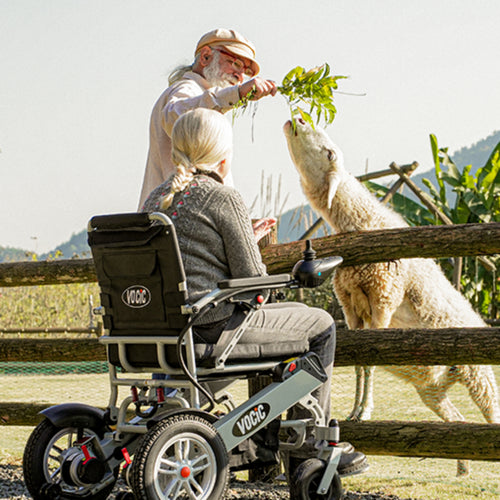Mobility scooters provide a convenient means of transportation, allowing users to navigate through various environments with ease. However, it is essential to prioritize safety while operating a mobility scooter to prevent accidents and injuries. By following a few safety tips, scooter users can ensure a smooth and secure ride.
In this article, we will discuss six important safety tips that every mobility scooter operator should keep in mind. So, let’s dive in and get started.
Importance Of Safety While Operating Mobility Scooters

The use of mobility scooters has become increasingly popular in recent years as these devices provide individuals with limited mobility the ability to travel easily and independently. While mobility scooters can significantly improve the quality of life for users, it's essential to prioritize mobility scooter safety while operating them.
Mobility scooter users often operate these devices in busy or crowded environments, which can increase the potential for accidents and injuries. Moreover, due to their motorized nature, users need to obey mobility scooter rules and regulations and must be extra cautious while operating these devices to ensure they are not putting themselves or others at risk.
Therefore, proper safety measures should be taken at all times when using a mobility scooter to ensure a safe and enjoyable experience for everyone involved.
Top 6 Tips When Operating Your Mobility Scooter
Tip 1: Perform Regular Maintenance Checks
Regular maintenance checks are essential for ensuring the safe and optimal operation of your mobility scooter. By performing these checks regularly, you can identify and address any potential issues before they become major problems. This not only helps to prolong the lifespan of your scooter but also ensures your safety while using it.
Safety issues are something we all need to pay attention to and care about. This article about top 6 mobility scooter Issues can give us many safety tips. You are welcome to check it out at any time.
Checking Essential Components Include
- Battery Charge: One of the crucial maintenance tasks is checking the battery charge and tire pressure. The battery is the power source for your mobility scooter, so it's essential to ensure it is properly charged before each use. Low battery levels can lead to unexpected power loss, which can be dangerous.
- Tire pressure: Checking tire pressure is equally important. Inadequate tire pressure can affect the stability and maneuverability of your scooter, putting you at risk of accidents. Use a tire pressure gauge to check the pressure regularly and inflate the tires to the recommended levels as indicated in the manufacturer's instructions.
- Braking System And Lights: Faulty brakes and lights can compromise your safety on the mobility scooter. Regularly inspect the mobility scooter braking system to ensure it is functioning correctly. Check for any signs of worn brake pads or loose brake cables that may need adjustment or replacement. Correctly functioning lights are crucial for visibility, especially during low-light conditions. Test all the lights, including headlights, taillights, and turn signals, to ensure they are working properly.
- Any Signs Of Wear Or Damage: Regularly inspect your mobility scooter for any signs of wear or damage. This includes visually checking the frame, seat, armrests, and any other components. Look for any cracks, loose bolts, or other indications of damage. Pay attention to the condition of the tires and check for any signs of excessive wear or punctures.
Tip 2: Wear Appropriate Safety Gear
Wearing suitable safety gear is essential to ensure your safety while operating a mobility scooter. It is vital to wear protective headgear such as a helmet to protect your head in case of an accident.
Reflective clothing or accessories such as vests, arm or leg bands, or reflective stickers can help increase the visibility of your scooter and yourself, especially during low-light conditions. It helps other road users to see you from a safe distance, reducing the risk of collisions.
Closed-toe shoes can help protect your feet and provide better traction on the footrests while riding on different terrain types. Prioritizing safety by wearing the right gear can help prevent injuries and enhance visibility, ensuring a safer riding experience for both the rider and others around them.
Tip 3: Obey Traffic Rules and Signals
When operating a mobility scooter, it is important to obey road rules for mobility scooters to ensure your safety and maintain a harmonious flow of traffic.
Treat your mobility scooter like a pedestrian by using designated paths and crosswalks whenever possible. Yield to pedestrians and follow traffic signals, just as you would when walking. It is crucial to be aware of right-of-way rules and give priority to vehicles or pedestrians when required.

By obeying road rules for mobility scooters, you can reduce the risk of accidents and conflicts with other road users, promoting a safe and smooth mobility scooter experience.
Tip 4: Avoid Rough Terrain
When using a mobility scooter, whether it is a 4 wheeler or 3 wheeler mobility walker, it is recommended to avoid rough terrain to ensure your safety and maintain the best performance of your mobility walker. Here are a few reasons why avoiding rough terrain is important:
1. Stability: Mobility scooters are designed to provide stability and maneuverability on smooth surfaces. Rough terrains, such as gravel paths or uneven pavement, can pose a risk of instability. The scooter may become difficult to control and can potentially tip over, leading to accidents and injuries.
2. Damage to the scooter: Rough terrain can put excessive strain on the scooter's components and lead to premature wear and tear. The wheels, suspension system, and motor may become damaged due to the constant vibrations and jolts. This can result in expensive repairs or the need for part replacements.
3. Battery drainage: Operating a mobility scooter on rough terrain requires the motor to work harder, leading to increased energy consumption. This can drain the scooter's battery faster and reduce the overall distance it can travel on a single charge. It is best to stick to smooth surfaces to conserve battery life and avoid getting stranded due to a depleted battery.
4. Comfort and accessibility: Rough terrain can make the ride uncomfortable, causing vibrations and jolts that can be unpleasant for the rider. Additionally, it may impede accessibility for individuals with mobility issues, making it more challenging to navigate and potentially causing discomfort or pain. Sticking to smooth surfaces ensures a more comfortable and accessible experience.
It is important to plan your routes and choose paths that are suitable for mobility scooters. Look for paved roads, sidewalks, or designated wheelchair-accessible routes. If you must navigate over minor obstacles, such as small thresholds or curbs, do so with caution and at slow speeds.
By avoiding rough terrain, you can protect your safety, prolong the lifespan of your mobility scooter, conserve battery life, and ensure a comfortable and accessible ride.
Click to learn: how long does a mobility scooter battery last?
Tip 5: Be Mindful of Weather Conditions

Being mindful of weather conditions is essential when operating a mobility scooter. Different weather conditions can pose unique challenges and risks, necessitating extra caution and preparation.
Rain can be particularly problematic as some scooters are not weatherproof, and the electrical components can be damaged by water. Additionally, rain can make surfaces slippery, increasing the risk of accidents. It is crucial to prioritize your safety and well-being by avoiding using a mobility scooter in heavy rain, if possible. If you must venture out in the rain, ensure that you have appropriate rain gear and consider using a waterproof cover for your scooter.
Windy conditions can also affect stability and control, requiring reduced speeds and a firm grip on the handlebars. Extreme temperatures can impact both the rider and the scooter, with heat leading to discomfort and possible heat-related issues, as well as cold affecting battery life and performance.
Snow and ice pose significant hazards due to reduced traction, making it advisable to avoid these conditions. Foggy conditions can limit visibility, necessitating extra caution and proper lighting.
To mitigate these risks, it is recommended to check the weather forecast before heading out and plan accordingly. If extreme weather is expected, consider postponing your trip or finding alternative transportation options.
Tip 6: Stay Visible and Alert
It is essential to prioritize visibility and alertness to ensure a safe experience. By being visible to other road users, you can minimize the risk of accidents and help others anticipate your presence.
- One way to enhance visibility is to wear brightly colored clothing or reflective materials, especially during low-light conditions. Adding reflective tape or stickers to your scooter can also increase visibility.
- Additionally, ensure that all the lights on your scooter, including headlights and turn signals, are in good working condition and turned on when necessary.
- Being alert to your surroundings is equally important. Avoid distractions, such as using mobile devices or wearing headphones, as they can compromise your ability to react to potential hazards.
- Maintain a vigilant mindset while operating the scooter, constantly scanning for any potential dangers, including vehicles, pedestrians, and obstacles.
- Listening to honking or other warning signals from nearby vehicles can also help you stay alert.
By staying visible and alert, you can greatly reduce the risk of accidents and promote a safer environment for yourself and others on the road.
Conclusion
Using mobility aids can significantly improve the quality of life of individuals with limited mobility. However, ensuring mobility scooter safety while using these scooters is of utmost importance. By following the tips included in the article, users can minimize the risk of accidents and injuries.
Regular maintenance and proper training on how to operate the scooter safely are crucial aspects to consider. By prioritizing safety and taking necessary precautions, individuals can confidently navigate their surroundings and enjoy the independence and freedom that mobility scooters provide.







